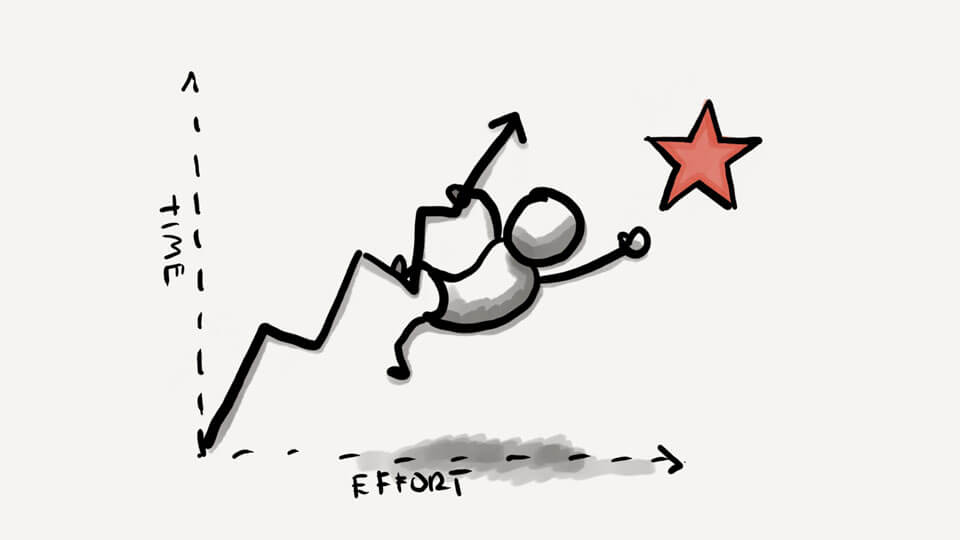What are your writing dreams? To get published? To earn a full time living from your writing? To see your book on a shelf in a bookstore? Or are you one of those rare individuals who write for pleasure alone?
Whatever the answer, you might be setting yourself up for failure. Having only long-term, far-reaching goals can be as bad for you as not having goals at all.
Sizing Your Dreams with a Tape Measure
If your only goal is to get published, earning yourself that important distinction between a writer and an author, then you’ve just set yourself up for frustration and depression.
Being published is a binary state. You’re either published (in the traditional sense, not self-published), or you’re not. According to this measure, you’re either a success or a failure. No one can take that kind of pressure.
Try to look beyond the obvious. Every writer is so much more than their publication status. You’re a collection of your life’s experiences, the books you’ve read, the places you’ve traveled to, the influences other people have had on your worldviews, the time you put into writing, your health, and creative potential, your skill with words, your imagination, your wealth (also an important factor), or even how good you are with people. A hundred different factors contribute to the writer you are today.
Being published, earning a living, or seeing your book in print– you should view these as merely the results of previous years of dedication.
Lead and Lag Metrics
Many of us work in the corporate world. We spend hours each year sitting through big boring calls, playing bullshit bingo while listening to upper management jump through mental hoops to the applause of the boards of directors. But there’s a reason why corporations are doing so well, and lessons to be learned.
In business, there are two popular types of measures: lead, and lag metrics.
For example, if we wanted to lose weight, the three simple things we could measure would be our calorie intake, the amount of daily exercise, and body weight. The important distinction to make is that while you can choose to eat less or exercise more, you can’t choose to weigh less in the morning. And though our total weight is the most important measure for us, it is also a lag measure, because it results from (or lags behind) our other habits. As you can guess, eating and exercise are examples of lead metrics, because they lead the way for our future weight.
In writing, being published, or earning a living are also lag metrics, and not very useful for that.
What should we measure then?
Whatever your long-term goals, here are some great lead metrics that could help you make your dreams come true, even if in a slightly corporate fashion.
Words/pages written and words/pages edited.
Hours of writing and hours of editing.
Hours of deliberate practice.
Sent querry letters, or magazine submissions.
Books about writing read.
Stories written.
Rejection letters.
Freelance jobs applied for.
Training courses completed.
Books read.
Manuscripts exchanged.
You have a direct influence over all of the above, which makes them excellent for tracking your progression as a writer.
I track three things right now. Hours wrote or edited (I’m at 1821 total), books read each year (I average 50+ books a year), and rejection letters (117 as of today). I don’t even keep track of the number of stories I sold, or how much money I made.
Working Backwards from Your Goals
Another topic worth mentioning in the context of dreams, goals, and ambitions is working backward from where you want to be. It’s the kind of no-bullshit kind of thinking we could all use every now and again.
Say you want to earn a living from your writing. How much is that in your country? The current average salary in the US is $45000 a year.
Do you want to earn that from the books and short stories you sell?
According to Jane Friedman’s “On The Business of Being a Writer,” advances for new authors run between $2000 and $10000, sometimes going as high as $20000 for particularly hot material that is a guaranteed hit. So, how many spectacular books a year would you need to write to reach the national average? Four? Five? A tall order, isn’t it?
But only by taking this no-nonsense view of your goals, do allow yourself to figure out realistic ways to get there. If you only want to write books, maybe you should hold on to your day job? If you’re open to other kinds of jobs, you can start looking for freelance writing opportunities. If you’re good enough, you can start teaching writing for money.
If you can figure out where your $45000 could come from, it will be easier to go after it. By expressing our dreams in numbers, we might be stripping them clear of romance, but we’re also getting closer to making them a reality.

